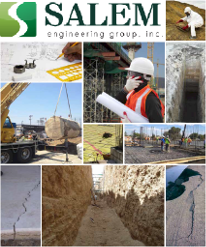SALEM Engineering Group, Inc. provides site specific seismic hazard and geologic evaluations for commercial, industrial, educational, and residential projects. SALEM Engineering Group, Inc. will recommend specific field, laboratory, and geological evaluation protocols for assessing the subject property and its features.
Using specialized field exploration equipment, we conduct field investigations under the supervision of a licensed engineer or geologist.
Seismicity Hazard Determinations
The study of faulting and earthquake hazards draws on the disciplines of structural engineering, structural dynamics, seismology, geology, geotechnical engineering, and probability to comprehensively assess foundation and structure performance related to seismic influences.
SALEM Engineering Group, Inc.’s team of geotechnical and structural engineers evaluate the nature of seismic hazards, such as estimating the probability of a large magnitude earthquake, the distance to active faults, and assessing whether the site soils are susceptible to liquefaction or lateral spreading which could weaken the site soils.
Ground Motion Hazard Analysis
We perform seismic hazard analyses (both deterministic and probabilistic), develop site-specific ground motions for seismic evaluations, evaluate the dynamic response and seismic deformations of earth structures, and perform liquefaction hazard evaluations.
Faulting Rupture Hazard Evaluations
Earthquake Fault Zones (formerly called Alquist-Priolo “Special Studies Zones”) have been established around active faults to prevent the location of structures for human occupancy across traces of these faults, thereby minimizing the potential for losses from surface fault rupture. A Fault Rupture Hazard Evaluation is conducted to evaluate the presence of active fault rupture(s) within portions of development projects that might fall within an Earthquake Fault Zone. An evaluation may incorporate several investigative techniques, including fault trenching and trench wall logging, continuous coring, cone penetrometer tests (CPT), seismic refraction, electrical resistivity surveys, and often, a combination of these and other methodologies.
Borrow Source Investigation
Major construction projects often require the import of large volumes of fill material. SALEM Engineering Group, Inc. can perform an evaluation of a proposed “borrow” source of that material, including determining the available volume and quality. SALEM can perform the geotechnical laboratory testing of that material to verify the borrow source quality meets the project design specifications for imported material.
Aggregate Resource Evaluation
Sand and gravel extraction represents the largest mining sector in the Unites States. SALEM Engineering Group, Inc. can perform a resource evaluation of potential mine sites or expansions that includes drilling using Becker-hammer or sonic drilling methods, borehole logging, and sampling over discrete depth intervals. Collected materials may then be evaluated for aggregate quality including abrasion, soundness and degradation to assess the material quality for use as base rock and in Portland cement concrete.
Related Services

Biological Resources
SALEM utilizes strategically aligned Registered Professional …

Environmental Consulting
Our clients trust SALEM Engineering Group, Inc. to provide highly …

Geotechnical Engineering
SALEM Engineering Group, Inc. offers a wide range of geotechnical …

Land Use Planning
Our team of certified professionals have provided environmental …


